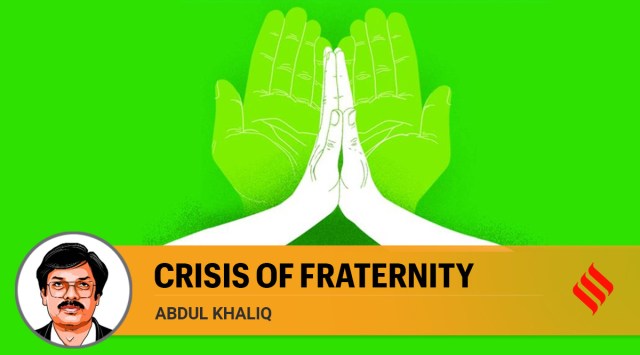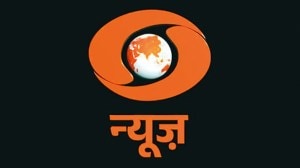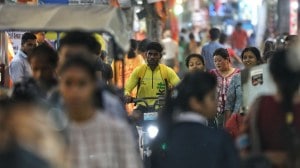- India
- International
A dirge for secularism in India
🔴 Along with the resurgence of religiosity has come the “othering” of Muslims and, to a lesser extent, Christians, who now live in a social milieu bristling with distrust and hate
 Secularism has meant different things for different nations. The French have a term – laicite -- to define their form of secularism that not only segregates the state from religion but also banishes religious practice and insignia from the public square. (Illustration: Suvajit Dey)
Secularism has meant different things for different nations. The French have a term – laicite -- to define their form of secularism that not only segregates the state from religion but also banishes religious practice and insignia from the public square. (Illustration: Suvajit Dey)In what could pass for a handout from a spokesperson of the government or the Nagpur headquarters, 32 retired IFS officers last week berated critics for “a sustained smear campaign against the present government on its presumed violations of the secular ethos of the country”. Ironically, their angry outburst comes at a time when respected international rating agencies have variously dubbed India an “electoral autocracy”, a “flawed democracy” and as a “partially free democracy” in the wake of unremitting attacks on minorities and dissidents.
The detractors are accused of “anti-Hindu tirades” by reason of their opposition to the Hindutva ideology and the government, implying thereby that this regime and Hindutva embody the Hindu ethos, which many would see as an insult to a great religion. The government’s apologists argue that “the attacks on majoritarianism are a way to question the mandate that the democratic process gives to the political party that wins elections legitimately and considers itself obliged to the electorate to implement its declared agenda lawfully”.
In their skewed understanding, laws like the plainly discriminatory Citizen Amendment Act (CAA) are just since they have been passed by a duly-elected government. But the Nuremberg and Jim Crow laws were also ratified by elected legislatures. The refusal to acknowledge the persecution of Muslims, Christians and political dissidents is akin to the Big Lie of American republicans, denying that Donald Trump lost the presidential election or had anything to do with the insurrection on Capitol Hill on January 6, 2021. Amidst such frightening social discord, secularism as the underpinning credo of our multi-religious country is clearly under threat.
Secularism has meant different things for different nations. The French have a term – laicite — to define their form of secularism that not only segregates the state from religion but also banishes religious practice and insignia from the public square. In contrast, the US, UK, and, until a few years ago, India, adhere to multiculturalism, where one can be a good citizen and at the same time publicly identify with a culture that is not the ascendant one. Sadly, India can no longer claim to be the secular republic proclaimed in our Constitution. There has been an abrasive intrusion of religion onto the public square. Today, the religion of the majority enjoys state patronage whereas other religions are tolerated, some more than others. The Ayodhya verdict, by privileging faith over the law, was a body blow to the foundational idea of a secular republic. Last year, the prime minister of the country laid the foundation stone of the Ayodhya temple in an elaborate religious ceremony. The cries of “Jai Shri Ram” that rent the air were nothing short of a dirge to secularism. Along with the resurgence of religiosity has come the “othering” of Muslims and, to a lesser extent, Christians, who now live in a social milieu bristling with distrust and hate. An unremitting horror story plays on, with the call for the genocide of Muslims, the hounding of Christians, the state-sponsored eviction drives in minority-dominated areas, the disruption of the prayer services of minorities, etc.
In this grimmest of times for minorities, a section of the Muslim elite under the banner of Indian Muslims for Secular Democracy (ISMD) provided unintended grist to the agenda of the rabid right-wing by turning on those already under siege, allegedly for the crime that a handful of them supported the Taliban takeover in Afghanistan. The actions of a few deviants led these self-styled secularists to hector the entire Muslim community with the rhetorical question: “Do they want a reformed modern Islam or the old barbarism of the past decades?” By drawing a contextual relationship between the fiendish worldview of the Taliban and the Indian Muslim, they have reinforced the right-wing disinformation campaign stereotyping Muslims as bigoted, deeply patriarchal and intolerant.

But the real damage to the interests of Muslims from within the community has been wreaked by the All-India Muslim Personal Law Board (AIMPLB)’s unyielding obscurantism. Remember the Shah Bano case and the infamous intervention that fanned the fires of inter-religious conflict? And its opposition to the law upending the iniquitous instant triple talaq? The backward-looking AIMPLB’s grotesque response to the current attacks on Muslims is to urge the government to enact legislation against blasphemy, which is a painful reminder of Pakistan’s awful blasphemy laws. The demand of the AIMPLB is unconscionable, does not represent the community’s concerns and must be withdrawn.
Jawaharlal Nehru had presciently observed that too much religion and religiosity would destroy our nation. That seems to be happening already. How do we recover the secular essence that is the lifeblood of our country? Last year, the Delhi High Court underlined the need for a uniform civil code in order to overcome the tangles arising out of the differences in various personal laws. While the court’s prescription is unexceptionable, the rationale given was unconvincing. To believe, as the court does, that modern Indian society is “gradually becoming homogenous and the traditional barriers of religion, community and caste are slowly dissipating”, is an absolute travesty of facts. On the contrary, the crux of the problem is that our society continues to cling to archaic practices in the name of religion, caste or tradition. It’s high time that our interpersonal and social conduct is regulated by a uniform system of rules and regulations. The need of the hour is a uniform civil code that addresses issues of equality and gender justice, but the understandable fear is that under the present dispensation, such a code would be nothing more than the universalisation of the Hindu personal law.
(The writer is a former civil servant and Secretary General of the Lok Janshakti Party. Views are personal)
EXPRESS OPINION
More Explained
Apr 20: Latest News
- 01
- 02
- 03
- 04
- 05










































